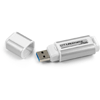- Qualcomm Launches Snapdragon 4 Gen 2 Mobile Platform
- AMD Launches Ryzen PRO 7000 Series Mobile & Desktop Platform
- Intel Launches Sleek Single-Slot Arc Pro A60 Workstation Graphics Card
- NVIDIA Announces Latest Ada Lovelace Additions: GeForce RTX 4060 Ti & RTX 4060
- Maxon Redshift With AMD Radeon GPU Rendering Support Now Available
Kingston DataTraveler Ultimate 3.0 32GB

If you’re in the market for a flash drive and your PC supports USB 3.0, seeking out a compatible product is a no-brainer. The speed potential is huge, and most often, the cost premium is not. In the case of Kingston’s DataTraveler Ultimate 3.0, it’s 2.5x faster than the fastest USB 2.0 drive, and features far better IOPS performance.
Page 3 – CrystalDiskMark, ATTO, Real-World
Over the past year, many storage companies have been jumping on the CrystalDiskMark bandwagon to help strut their product’s performance, and it’s easy to understand why. Compared to others, CrystalDiskMark delivers results that are much higher, and in some regards, they could be considered unrealistic given that real-world tests and even other synthetic benchmarks never seem to back up its claims. We include it for the sake of interest and because it is still a very thorough benchmark.


Like our previous couple of tests, Kingston’s drive falls behind both SSD-equipped models, which is to be expected. We’re still seeing some killer performance though, especially when compared to any USB 2.0 drive.
ATTO
While CrystalDiskMark does well to show the absolute top-end value of a storage device, ATTO doesn’t fall too far behind, if at all. Its test uses a wide-range of cluster sizes, for both read and write, but we only note 4KB, 64KB and 1024KB of the former. For those interested, we use a queue depth value of 10 for testing.

The performance continues to impress here, especially where 4K reads are concerned. There, Kingston’s offering keeps close to our SSD offerings, and even Seagate’s 3TB external hard drive.
Real-World
For real-world testing, we use a set of files and folders for the sake of measuring transfer speeds, and also convert images and music on the storage device to see just how well it fares for large intensive operations. For the transfer speeds, we use both 4GB and 16GB files and folders, and for the former, we also perform copy tests, which refers to copying the file or folder on the storage device. We don’t do this for our 16GB files and folders as some 32GB drives refuse it due to coming so close to the total density.

Compared to our SSD offerings, Kingston’s drive clearly lags behind, but given the pricing differences, it’s hard to not appreciate what we’re seeing here. We copied a 4GB file in a mere 64 seconds via USB 3, which oddly enough, equates to about 64MB/s.

We saw similar performance with our 16GB tests, with our solid 16GB file (15.6GB) coming out to about 66.56MB/s. Considering the drive is rated for 60MB/s, these results are great.

The result here is a bit surprising, with both Lightroom having run exceptionally well on Kingston’s drive. dBpoweramp fell in line with the others.
Support our efforts! With ad revenue at an all-time low for written websites, we're relying more than ever on reader support to help us continue putting so much effort into this type of content. You can support us by becoming a Patron, or by using our Amazon shopping affiliate links listed through our articles. Thanks for your support!





